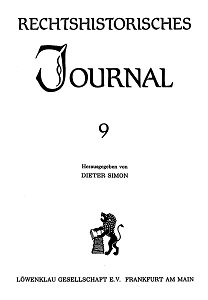Selbstorganisation und die Entstehung nationaler Rechtssysteme (17.-19. Jahrhundert)
Self-Organization and the Emergence of National Legal Systems (17th-19th centuries)
Author(s): Rudolf StichwehSubject(s): Philosophy of Law
Published by: Löwenklau Gesellschaft e.V.
Summary/Abstract: The considerations presented below are not the results of a research project that has been carried out. Rather, they have the status of conceptual preliminary considerations aimed at how the theoretical question of the autonomy of law can be specified in historical research. The term self-organization stands as a representative for a class of newer theories about autonomy, which are otherwise associated with names such as 'second order cybernetics', 'autopoiesis', 'constructivism' and 'operational closure'. As will become clear below, 'self-organization' was deliberately chosen as the title from these alternatives, because the demands on autonomy that arise under this premise are still comparatively elementary, and it is therefore obvious to first consider processes of progressive differentiation of a system in To address the terms of self-organization - and only then to ask whether and when more demanding autonomy conditions - such as those of a theory of autopoiesis - are fulfilled by the system in question.
Journal: Rechtshistorisches Journal
- Issue Year: 1990
- Issue No: 09
- Page Range: 254-272
- Page Count: 19
- Language: German
- Content File-PDF

